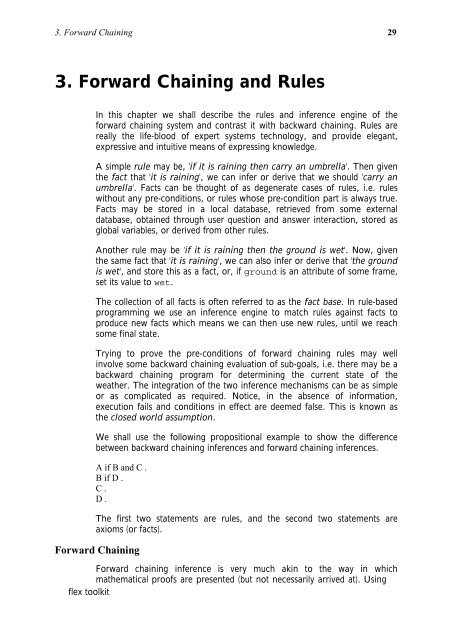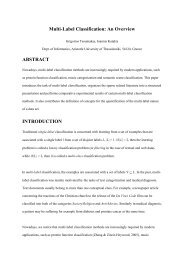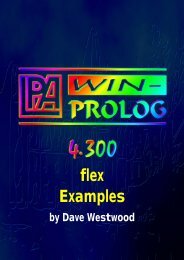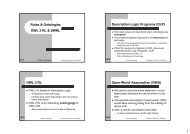You also want an ePaper? Increase the reach of your titles
YUMPU automatically turns print PDFs into web optimized ePapers that Google loves.
3. Forward Chaining 29<br />
3. Forward Chaining and Rules<br />
In this chapter we shall describe the rules and inference engine of the<br />
forward chaining system and contrast it with backward chaining. Rules are<br />
really the life-blood of expert systems technology, and provide elegant,<br />
expressive and intuitive means of expressing knowledge.<br />
A simple rule may be, 'if it is raining then carry an umbrella'. Then given<br />
the fact that 'it is raining', we can infer or derive that we should 'carry an<br />
umbrella'. Facts can be thought of as degenerate cases of rules, i.e. rules<br />
without any pre-conditions, or rules whose pre-condition part is always true.<br />
Facts may be stored in a local database, retrieved from some external<br />
database, obtained through user question and answer interaction, stored as<br />
global variables, or derived from other rules.<br />
Another rule may be 'if it is raining then the ground is wet'. Now, given<br />
the same fact that 'it is raining', we can also infer or derive that 'the ground<br />
is wet', and store this as a fact, or, if ground is an attribute of some frame,<br />
set its value to wet.<br />
The collection of all facts is often referred to as the fact base. In rule-based<br />
programming we use an inference engine to match rules against facts to<br />
produce new facts which means we can then use new rules, until we reach<br />
some final state.<br />
Trying to prove the pre-conditions of forward chaining rules may well<br />
involve some backward chaining evaluation of sub-goals, i.e. there may be a<br />
backward chaining program for determining the current state of the<br />
weather. The integration of the two inference mechanisms can be as simple<br />
or as complicated as required. Notice, in the absence of information,<br />
execution fails and conditions in effect are deemed false. This is known as<br />
the closed world assumption.<br />
We shall use the following propositional example to show the difference<br />
between backward chaining inferences and forward chaining inferences.<br />
A if B and C .<br />
B if D .<br />
C .<br />
D .<br />
The first two statements are rules, and the second two statements are<br />
axioms (or facts).<br />
Forward Chaining<br />
Forward chaining inference is very much akin to the way in which<br />
mathematical proofs are presented (but not necessarily arrived at). Using<br />
<strong>flex</strong> toolkit








